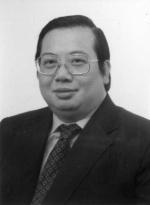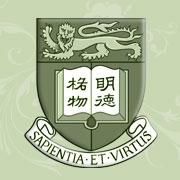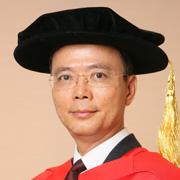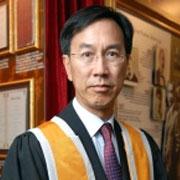
a milestone in the University's history.
To date, a total of 120 Endowed Professorships have been established.

 |
Albert Bing-Ching Young Professorship in Ophthalmology"This Professorship is named after my late husband, a man who believed in helping humanity through acts of philanthropy. It seemed only fitting to carry on his good intentions with a legacy which will continue in perpetuity." Mrs Felicia Young, in memory of her late husband, Albert Bing-Ching Young |
 |
Appointment to be announced |

Lam Wai-ChingAppointed in 2017
The Department of Ophthalmology at The University of Hong Kong (HKU) is located at Cyberport and its laboratories are in the Jockey Club Clinical Research Centre on Sassoon Road. A large part of the ophthalmology facilities, including an eye centre and state-of-the-art operating theatres, moved from Queen Mary Hospital to Grantham Hospital under a major re-organisation of the Hong Kong West Cluster of Hospitals.
Professor Lam Wai-Ching is the Clinical Professor of the Department of Ophthalmology at HKU. He obtained his BSc(Med) and MD from the University of Manitoba in 1982. After practising for several years in emergency medicine, he returned to complete his ophthalmology residency and vitreo-retinal fellowship at McGill University in 1992. In July, 2016, he accepted the Clinical Professor appointment at HKU. Professor Lam is a vitreo-retinal surgeon with clinical interests in adult and paediatric retinal diseases. His areas of research are age-related macular degeneration, diabetic retinopathy, paediatric retinal disease, retinopathy of prematurity, as well as other related areas in this field. His clinical expertise is in surgical and medical retina, particular in the field of paediatric retinal diseases. The management of paediatric retinal diseases is recognised as particularly challenging because of the special considerations associated with the anatomy, the healing process and the pathology. His research encompasses the use of novel imaging techniques to study the development of macula in infants, and developing safe surgical landmarks for the intraocular procedure in young children. His current research interest is in the retinopathy of prematurity in the search for ways to improve the management outcome in clinical and animal studies. Professor Lam became a Fellow of the Royal College of Physicians and Surgeons of Canada in 1992. In the same year, he joined the Department of Ophthalmology of McGill University as an Assistant Professor until 1995. In 1996, he joined the Department of Ophthalmology and Vision Sciences at the University of Toronto and took up the academic positions as the Continuing Education Director (1996-2016), the Residency Program Director (2001-2013), Professor (2010-2016), and the Vice-Chair, Education (2013-2016). From 2002 to 2016, he was also the Vitreo-retinal Fellowship Director for the University Health Network/Sunnybrook Health Science Center, University of Toronto. For his clinical and scientific work, Professor Lam received Achievement Awards from the American Academy of Ophthalmology and the Asian Pacific Academy of Ophthalmology, and the Senior Honor Award from the American Society of Retinal Specialists. He has published 70 peer-reviewed articles, authored seven book chapters, and serves as the reviewer for many journals. During his tenure at the University of Toronto, he won teaching awards from both the Faculty of Medicine and the Department of Ophthalmology. He received the Clinical Teaching Award from the Professional Association of Interns and Residents of Ontario, and the Excellence in Postgraduate Medical Education Award from the Faculty of Medicine, University of Toronto. He was also the recipient of the Ross Fleming Surgical Teaching Award in 2013 in recognition of his exemplary surgical teaching across all surgical specialties at the University Health Network (Toronto Western Hospital, Toronto General Hospital, and Princess Margaret Hospital). 
David S H WongAppointed in 2007
The Eye Institute, launched in 2003, is a research and teaching Department at the University that promotes eye care services to the wider community, through Queen Mary Hospital. The basic research undertaken by the Institute is supported, and nurtured, by the Department of Anatomy, and operates in collaboration with several areas, including neuroprotection, gene therapy and retinal and stem cell transplants. This year Professor David Sai-Hung Wong joined the University's Medical Faculty as Chair Professor of the Eye Institute, providing the opportunity for stronger international collaboration with the University of Liverpool in the United Kingdom. Professor Wong graduated from the University of Liverpool in 1978, became a Member of the Royal College of Physicians of the United Kingdom in 1981, a Fellow of the Royal College of Surgeons, England in 1983, a Fellow of the Royal College of Ophthalmologists in 1989 and a Fellow of the Royal College of Physicians in 2000. In 1987 he was appointed Consultant Ophthalmologist at the Royal Liverpool Hospital and, in 2003, was elected Chairman of the Scientific Committee of the Royal College of Ophthalmologists (RCOphth) as well as Senior Vice President of the RCOphth. He became an Honorary Professor in the Faculty of Medicine of the University of Liverpool in 2005. The importance of Professor Wong's research has been recognised as a significant British contribution to the treatment of retinal detachment and he has conducted several large-scale clinical trials involving centres throughout Europe. He is the founding member of the British Association of Vitreoretinal Surgeons and board member of European Society of Retinal Specialists. His current research focuses on proliferative vitreoretinopathy – the most common complication of a retinal detachment - and macular degeneration and their pathogenesis. He is conducting clinical trials of surgery with adjuvant therapy and developing new surgical techniques and tamponade agents. Professor Wong has published over one hundred journal articles as well as eighteen chapters in four books, and has been invited to lecture in Europe and Australia. He is an examiner for the Royal College of Ophthalmologists; sub-editor of the Graefe's Archives of Clinical and Experimental Ophthalmology; co-editor for the Essentials of Ophthalmology and the editorial panel member of the Zhong Hua Yan Di Bing Za Zhi. |